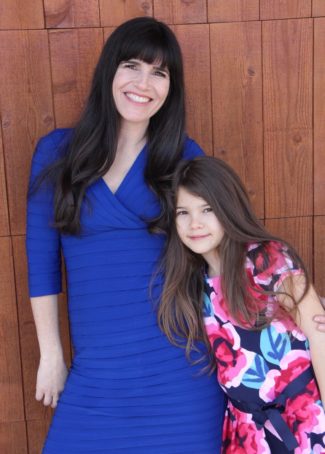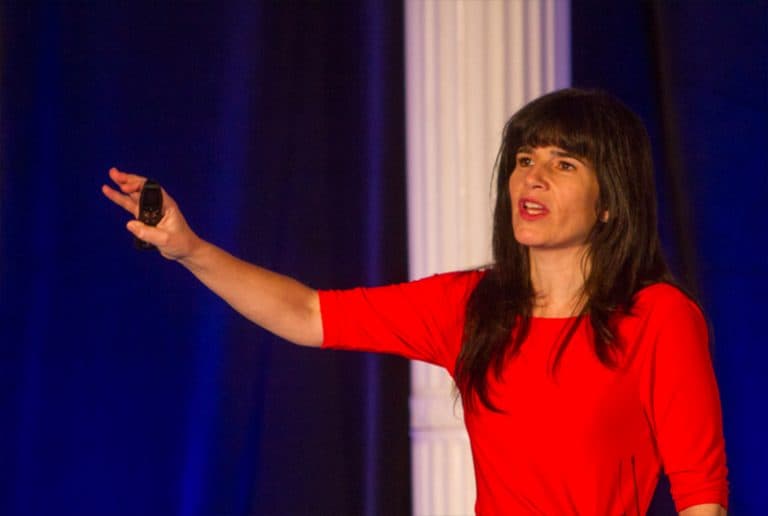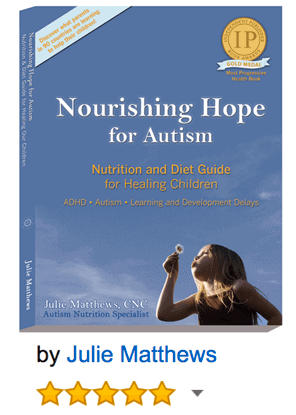Meet Julie Matthews, M.S.
 Julie Matthews is a Certified Nutrition Consultant and published researcher who received her master’s degree in medical nutrition, with distinction, from Arizona State University. She is a globally respected nutrition expert, published researcher, award-winning author, and inspirational educator. Her guidance is backed by over twenty years of clinical experience and scientific research with complex neurological and physiological needs; particularly autism.
Julie Matthews is a Certified Nutrition Consultant and published researcher who received her master’s degree in medical nutrition, with distinction, from Arizona State University. She is a globally respected nutrition expert, published researcher, award-winning author, and inspirational educator. Her guidance is backed by over twenty years of clinical experience and scientific research with complex neurological and physiological needs; particularly autism.
She has lectured in more than 60 cities across three continents, been on television, radio, newspaper, blogs/podcasts and more, and published scientifically referenced articles in journals and websites.
Julie’s been featured by Price-Pottenger, honored by the National Association of Nutrition Professionals, sits on two scientific advisory boards including the Autism Nutrition Research Center. Julie is co-author of “gold standard” scientific research published in the journal Nutrients, demonstrating the efficacy of diet and nutrition intervention for autism spectrum disorder and a study on “The Effectiveness of 13 Therapeutic Diets for Autism” published in the Journal of Personalized Medicine.
Julie is a dynamic speaker that’s educated professionals at trainings for Integrative Medicine for Mental Health, Autism Research Institute/DAN!, Medical Academy of Pediatric Special Needs, and the MINDD International Forum in Australia.
During her early nutrition studies in 2001, Julie discovered that food and nutrition influenced the disorder of autism.

She committed to investigate the connections and to explain them to parents and clinicians that can make a difference helping children recover.

Her final research paper at Bauman College became the basis for her award-winning book Nourishing Hope for Autism, which won the gold metal in 2009 for “Most Progressive Health Book.” It explains WHY food and nutrition affects the varied systems and biochemical pathways routinely occurring in autism and HOW to strategically apply a specialized diet to help children heal.
After many years in practice, it became evident to Julie that the dietary approaches that helped the most difficult clients, were useful in healing most chronic conditions.
And because autism is one of the most complex disorders (with underlying immune/autoimmune, digestive, neurological, and metabolic dysfunction issues), it provides a unique perspective on chronic disease that helps Julie teach others to see hidden connections between symptoms, circumstances, and effective healing dietary strategies for a wide variety of complex conditions.
She founded Nourishing Hope in 2005 to stand for the efficacy of improved diet and nutrition for autism, and the BioIndividual Nutrition Institute in 2014 to share the synthesis of her knowledge with cutting edge clinicians to help improve their effectiveness by personalizing therapeutic diets. Julie has concurrently been focused on Nutrition for Healthy Pregnancy and Baby, putting all of her research, knowledge, and experience into teaching prevention/promoting health.
She’s created Nourishing Hope for Baby and the website at https://NutritionForPregnancy.com.
After twenty total years of dedication, Julie’s global Nourishing Hope Community comprises families in over 146 countries, and BioIndividual Nutrition Practitioners in 48 nations.
There is global community, there is support, there is hope.


As a Mother…

Julie practices what she teaches about nutrition and nourishing hope – becoming pregnant at age 39 and delivering her healthy baby girl safe at home, with midwife, doula, and husband assisting. And teaching her daughter healthy gluten-free eating and cooking.
Her knowledge and know-how was earned through YEARS of research/clinical experience and countless Saturdays as an allergen-free alchemist (i.e. chef) – in the kitchen, grocery store, or library, learning to “make it work” for even her most challenging clients.
Home and Lifestyle
 Julie is also an accomplished Fire Poi dancer – which is all about movement and flow – and can be done with lights or fire! Her range of interests, passions, and talents is vast – stemming from a fundamental love of life, people, and happiness.
Julie is also an accomplished Fire Poi dancer – which is all about movement and flow – and can be done with lights or fire! Her range of interests, passions, and talents is vast – stemming from a fundamental love of life, people, and happiness.
Julie is also an avid Taiko drummer and roller skater. And now she is an accomplished homeschool teacher.
She co-founded Nourishing Hope (originally Healthful Living) with her husband and business partner, Martin Matthews, back in 2001. Together they are committed to co-creating, sharing, and impacting the world together.
